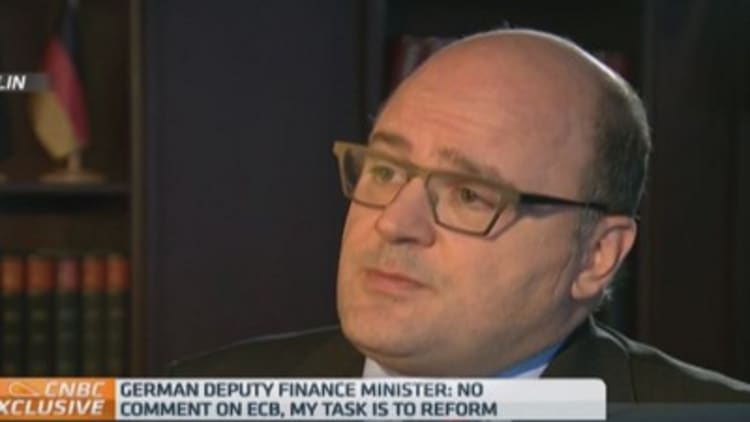
Despite data showing that the euro zone has slid into deflation, Germany's deputy finance minister brushed off concerns that the region could enter a downward spiral of falling prices and lack of demand.
"This is not what economists and textbooks describe as a deflation spiral, this is a modest price development," Steffen Kampeter told CNBC Thursday.
He also said that the German economy was growing "beyond expectations" and could exceed recent growth forecasts for this year.
Data released last week showed that the 19-country single currency region had entered deflation territory in December. Prices in the euro zone fell 0.2 percent year-on-year in December, marking the first time since 2009 that prices have dipped into negative territory.
The decline in prices has been largely attributed in the cost of oil, which has slipped over 60 percent since June 2014.
However, core inflation, which strips out volatile factors like fuel and unprocessed food prices, was stable at 0.7 percent in December.
"I see the facts," Kampeter said. "And the fact is that the core inflation is rising and we have a very moderate and negative price development, especially in energy and raw material."
Deflation concerns analysts because a decline in the price of goods can cause consumers to delay purchases in the hope of further price falls, putting pressure on the broader economy.
The figures prompted widespread market speculation that the European Central Bank (ECB) could announce a full-scale quantitative easing program when it meets on January 22. The deputy finance minister wouldn't comment on any forthcoming ECB action, however.
Read MoreWhy European QE may not work
The Germany economy – which is the largest in the euro zone – has staged something of a turnaround of late, after veering dangerously close to recession in 2014.
Read MoreWhy Germany's having a merrier Christmas
The economy contracted 0.2 percent in the second quarter of 2014 but managed to avoid recession when it expanded 0.1 percent in the third quarter. Technically, a recession is a contraction in gross domestic product (GDP) over two consecutive quarters.
In December, Germany's central bank, the Bundesbank, downgraded its growth predictions for Germany, forecasting growth of only 1 percent in 2015. But Kampeter said he believed that could be a conservative estimate.
"The good news is Germany is still growing and will grow on. We have been growing beyond expectations and the main factor is that private demand is working quite well and I wouldn't be surprised if our (growth) predictions for 2015 will be enhanced by this development," he said.
In December, a raft of positive data showed that – for the German people, and business leaders at least – the outlook was bright. German consumer sentiment rose to its highest level in eight years in December, and business confidence increased for the second month in a row.
As a German policymaker, Kampeter said he was tasked with looking at structural reforms in Germany and Europe as a whole, and was aiming to ensure that investment in Europe continued in order to keep the region competitive.
- Written by CNBC's Holly Ellyatt, follow her on Twitter @HollyEllyatt. Follow us on Twitter: @CNBCWorld




